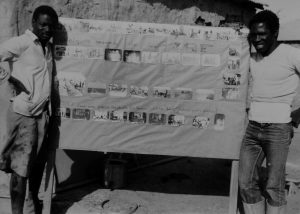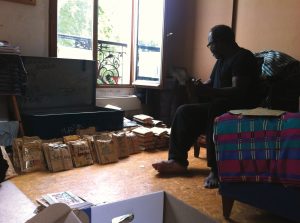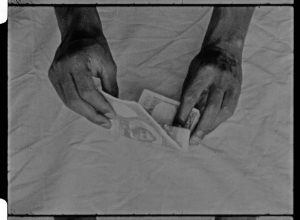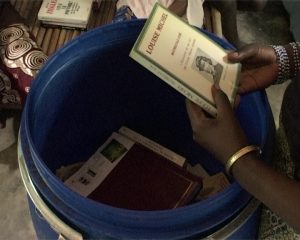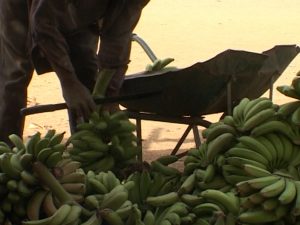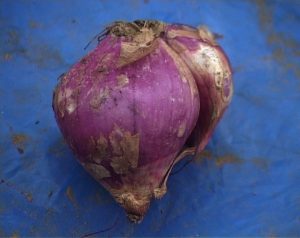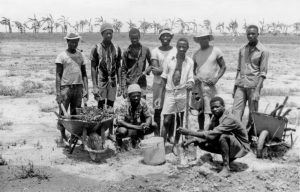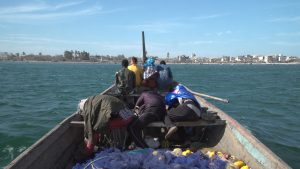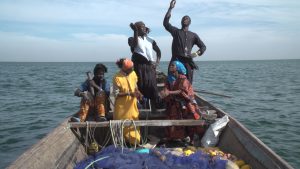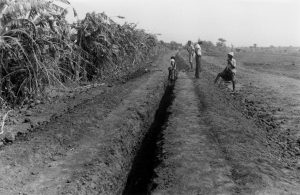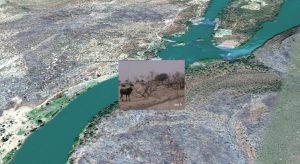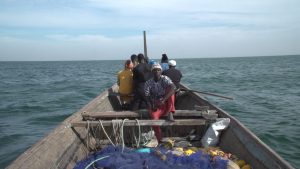Sowing Somankidi Coura: A Generative Archive
(31)

Sowing Somankidi Coura, a Generative Archive is a long-term research endeavor by Raphaël Grisey in collaboration with Bouba Touré around the permacultures and archives of Somankidi Coura, a self-organized agricultural cooperative along the Senegal river founded by a group of former African migrant workers and activists in France in 1977 after the Sahel drought of 1973. Sowing Somankidi Coura unfolds and generates cine-geographies that reveal the boundaries between the liberation struggles of migrant workers in France, the Pan-African history of the cooperative and potentialities of permaculture.
Through a practice of filmmaking, archiving, publication, workshop and theatre, Sowing Somankidi Coura, engages in the articulation of liberation narratives, collective care and peasant alliances towards a denaturalisation and decolonization of development politics.
The research navigates the liaisons across partial perspectives; situated knowledges and ecosystems; hetero-temporalities; affinities between soils, plants, animals and farming technologies; archives and reservoirs. Deploying diverse modes of image circulation, the work aimed at resisting forces of erosion, determination, national migration management politics, and the patenting of colonial agro-industries.
Research Locations
- Somankidi Coura, MALI
- Paris, FR
- Kayes, MALI
- Berlin, DE
- Dakar, SN
- Pantin, FR
- Trondheim, NO
Participants
Bouba Touré, Raphaël Grisey and the agricultural cooperative of Somankidi Coura
Related Works
Related Publications
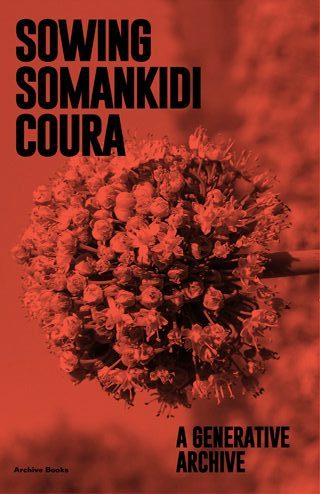
Sowing Somankidi Coura
A Generative Archive
2017
Archive Books

Second Yinchuan Biennale:
Starting from the Desert. Ecologies on the Edge
2018
Mousse publishing
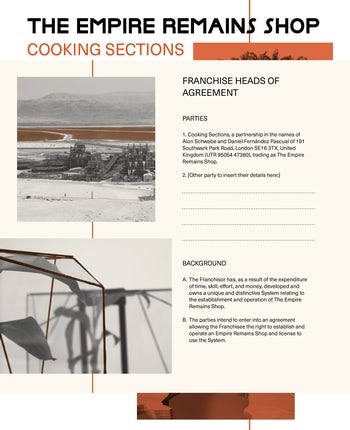
2018
Columbia Books on Architecture and the City
Collaborators' Works in Relation
Bouba Touré
Bouba Touré, 58 rue Trousseau, 75011 Paris A film by Bouba Touré, 2008
The video Bouba Touré, 58 rue Trousseau, 75011 Paris, France by Bouba Touré was shot in Bouba Touré’s former flat in Paris in 2008, a two-room apartment with many photographs, posters, and keepsakes on the walls. The video, shot in two takes, is led by the images on the wall. Touré links many political struggles of the last 50 years with his life, showing and speaking about them. Touré’s narration find his own rythm and a condition of speech by repeating certain lines. Bouba Touré started complementing his photographic diary that he initiated in the 1970’s to document African migrants’ lives and struggles and the cooperative of Somankidi Coura, with video diaries. Bouba Touré, 58 rue Trousseau, 75011 Paris, France, is one of the first tapes that he recorded while Raphaël Grisey was filming Cooperative. The video was given to Raphaël Grisey for its diffusion. The editing of Cooperative was made in relation to Bouba Touré, 58 rue Trousseau, 75011 Paris, France and shown together.
Archival Film
Nationalité : Immigré (1976, 69min)
Directed by: Sidney Sokhona
Nationalité : Immigré by Sidney Sokhona (1976, 69min)
With Nationalité : Immigré, Sidney Sokhona introduces a new tone in the cinema of the African diaspora: powerfully confident, explicitly political and radically critical of all forms of discrimination against immigrants—in particular the paternalism of the French left.
« One could hardly be blamed for interpreting NATIONALITÉ: IMMIGRÉ as an endless litany of dehumanizing bureaucratic obstacle courses – as Serge Daney pointed out in his review “On Paper”, the film juts uncomfortably against the militant Left’s emphasis on using rupture theory to delegitimize the legal process, a high-minded option unavailable to immigrants like those depicted here. Sokhona took to filming after the Aubervilliers scandal of January 1970 – when five African migrants died in an overcrowded shelter on the periphery of Paris due to asphyxiation – prompting then-Prime Minister Jacques Chaban-Delmas to declare an end of these settlements, sometimes nicknamed bidonvilles or caves, by 1973. The filmmaker wasn’t so optimistic – but then, what NATIONALITÉ: IMMIGRÉ does offer is a rare glimpse at community organizing coming into praxis on both sides of the camera, with many of Sokhona’s neighbors playing themselves. (Sokhona financed the film in piecemeal fashion once scene at a time while working as a telephone operator.) While the thrust of NATIONALITÉ: IMMIGRÉ is unabashedly polemical, the loose narrative structure allows Sokhona to pursue fascinating side-stories and political tangents, at times dipping from what appears to be pure verite into a purely Brechtian exercise wherein immigrants are handed jobs in the form of huge placards, which they must carry around their necks, denoting their net worth to society in material terms. » Steve Macfarlane
Archival Film
Safrana, or Freedom of Speech (Safrana ou le droit à la parole) (1978, 99min)
Directed by: Sidney Sokhona
Four African immigrant workers—one of them played by Bouba Touré—decide to leave Paris to train with farmers in the French countryside and then attempt a professional reinsertion in their country of origin. In the bus that takes them to the farms, they evoke their Parisian experiences: the miseries and derision that are the daily lot of the immigrant. With nothing to lose by leaving Paris, they hope that what they learn will prove useful when they return to their homeland.
Workshop
Figuring Fallow Time (Part 1)
Agro-Pastoral Ecosystems and Theatre of the Oppressed Practices in the Face of Climate Breakdown
Workshop Info
-
With Diol Mouhamadou, Bouba Touré, Raphaël Grisey, Sissel A. Berg, Bjørg Nyjordet, Magnar Gilberg, Jostein Trøite (Oikos), M. Trøite, Aina Bye, Anne-Gro Erikstad amongst others.
LevartLevanger, NO
October 11-13, 2018
Figuring Fallow Time (Part 2)
Agro-Pastoral Ecosystems and Theatre of the Oppressed Practices in the Face of Climate Breakdown
Workshop Info
-
Participants: Raphaël Grisey, Bouba Touré, Unni M. Fjellheim, Diol Mouhamadou, Anne-Gro Erikstad, Parisa Akbarpour, Salahedin Naderi, Shela Sheikh, Bjørg Nyjordet, Magnar Gilberg, Mamoun Jabari, Gunel Movlud, Mahla Nouruzi, Ida Warholm Bjørken, Aleksander Furunes, Leika Furunes, Amelia Fonfara, Marius Aasprong, Kathrine Butcher, amongst others.
Levanger, NO
5 April–7 April 2019
Research Presentations
-
London, UK
19 September–27 April 2025Exhibition -
Xaraasi Xanne (Crossing Voices)/ Bijoux Cailloux, WAKA cinema, NW
An invitation by Annabelle Aventurin and Guy Woueté07 September 2024Film Screening -
Lisboa, PT
03 July 2024seminar -
Paris, FR
29 June 2024Film Screening -
Venarey-Les Laumes, FR
28 June 2024Film screening and discussions -
Gränser Ramsor (Spelling Borders)
Patrik Haggren, Daniel TerresHavremagasinet länskonsthall Art
Boden, SE
08 June–29 September 2024Exhibition -
Xaraasi Xanne (Crossing Voices)/ Ciné Club Ciné Espoir
Yennenga Center and Mobile Lab Senegal in collaboration with the Federation of Ciné-Club of SenegalMbacké, SN
03 June 2024Film Screening and waxtaan -
DAMSLab Auditorium, unibo Bologna
Bologna, IT
30 May–31 May 2024Seminar, screening, book launch -
Paris, FR
16 May 2024Film Screening -
20 April–24 November 2024Exhibition
-
L'Ile Saint Denis, FR
29 March 2024Book launch, film screening and discussions -
Trondheim, NO
15 March 2024Film Screening -
Mas de Granier Cooperative agricole Longo Mai
Plaine de la Crau, FR
02 March 2024Projection et discussion -
Paris, FR
01 March 2024Projection et discussion -
Paris, FR
06 February 2024Film screening and Q&A -
Montréal, CA
30 January 2024Film Screening -
Montréal, CA
27 January–16 March 2024Exhibition -
Budapest, HU
22 November–29 November 2023Film Screening -
Xaraasi Xanne (Crossing Voices) / Festival des Cinémas d’Afrique
with Soso Soumaré11 November–12 November 2023Film screenings and talks -
Freiburg, DE
09 November 2023Film Screening -
London, UK
04 November 2023Film Screening -
24 October–01 November 2023Film Screening
-
18 October 2023Film Screening
-
Yamagata International Documentary Film Festival
Yamagata, JP
05 October–12 October 2023Film Screening -
Xaraasi Xanne (Crossing Voices)/ Festival Allez Savoir
Discussion with Soso Soumaré and Raphaël GriseyCentre de la Vieille Charité - salle du Miroir
Marseille, FR
24 September 2023Filmscreening and talks -
24 August 2023Film Screening
-
La Salvetat, Plateau du Larzac, FR
04 August 2023Film Screening -
Machinations
curated by iLiana FokianakiMuseo Nacional Centro de Arte Reina Sofia
Madrid, ES
20 June–28 August 2023Exhibition -
08 June–15 June 2023Film Screening
-
Santarem, PT
24 May–28 May 2023Film Screening -
Rennes, FR
10 May 2023Screening and talk -
Gabès, TU
27 April–02 May 2023Film Screening -
Mboro, RAW Material, Centre Kàddu Yaraax
Mboro, Dakar, SE
27 April–30 April 2023Screenings, talks, pencoos and people's education -
Salvador de Bahia, BR
12 April–23 April 2023Film Screening -
Marseille, FR
07 April–09 April 2023Workshops, screenings and talks -
Bucarest, RU
01 April–03 April 2023Film Screening -
Xaraasi Xanne (Crossing Voices) at No-U-Turn Cinema
No-U-Turn CinemaBerlin, DE
15 March 2023Film Screening -
London, UK
07 March 2023Film Screening -
Columbia, USA
02 March–05 March 2023Film Screening -
St Denis, FR
26 February 2023Film Screening -
Ouagadougou, BF
25 February–04 March 2023Film Screening -
Poitiers, FR
24 February 2023Film Screening -
Johannesburg, SA
31 January–05 February 2023Film Screening -
Berlin, DE
21 January 2023Film screening, exhibition and talk -
07 January–23 January 2023Workshop
-
Paris, FR
04 December 2022Film screening and talks -
London, UK
30 November 2022Film Screening -
Montréal, CA
19 November–26 November 2022Film Screening -
São Paulo, BR
11 November–13 November 2022Screening and online screening -
Cine Humberto Mauro, Palácio das Artes, Forumdoc Festival
Belo Horizonte, BR
10 November–20 November 2022Film Screening -
Marseille, FR
30 October 2022Film Screening -
Paris, FR
27 October 2022Film screening and discussion -
22 October 2022Film Screening
-
Bologna, IT
21 October 2022Film Screening -
Guadeloupe, FR
14 October–21 October 2022Film Screening -
Lisboa, PT
06 October–16 October 2022Film Screening -
Xaraasi Xanne (Crossing Voices), Xeex Bi Du Jeex / Disobedience Archive
an invitation by Disobedience Archive [Ders Bitti]Istanbul, TK
17 September–20 November 2022Exhibition and film screening -
14 September 2022Film Screening
-
Maison Composer / Festival Ciné Pampa!
Saints-En-Puisaye, FR
25 August–29 August 2022Film Screening -
DE, FR
15 August–17 February 2023TV broadcast and Replay -
Théatre Municipal de Viviers
Viviers-Ardêche FR
27 May 2022Film Screening -
Villejuif, Val-De-Marne, FR
21 May–21 May 2022Film Screening -
Museum der Arbeit Triennial of Photography
Hamburg, DE
20 May–03 October 2022Exhibition and film screening -
Geneva, CH
10 May–17 April 2022Film Screening -
St Louis, SE
10 May–14 May 2022Film Screening -
Toronto, CA
28 April–08 May 2022Film Screening -
27 April 2022Film Screening
-
Paris, FR
11 March–20 March 2022Film Premiere -
Bruxelles, BE
04 March–05 March 2022Film Screening and seminar -
Paris, FR
01 March–31 May 2022 -
Traana / Xeex Bi Du Jeex – Blå Stället
Emma Dominguez, Raphaël Grisey, Bouba Touré and Kàddu Yaraax12 February–12 February 2022Film Screening -
23 June–09 September 2021Exhibition
-
Turino, IT
07 May–01 October 2021Exhibition -
Berlin, DE
26 October–01 November 2020Screening, lecture, seminar -
Living Montage. Bouba Touré’s Photographic and Political Practice
A text by Frida Sandström15 September 2020Text -
Göteborg, SE
07 March 2020Screening and talk -
Festival de l’Union : Xeex Bi Du Jeex–A Luta Continua
A Theatre Forum performance by Kaddu Yaraax written by Kaddu Yaraax, Raphaël Grisey and Bouba TouréTambacounda, SE
21 February–23 February 2020Performance and Theatre Forum -
DAS 2020, Seismic Movements: Xeex Bi Du Jeex – a Luta Continua
An invitation by Raw Material CompanyDakha, Bangladesh
07 February–15 February 2020Film screening and talk -
Dizziness of Irrigation Systems
A text by Sasha Shestakova and Anna EngelhardtMoscow, RUS
27 January–30 June 2020Text and online screening -
Fonction Critique 2
curated by Manuel FadatMontpellier, France
17 January–07 February 2020Exhibition -
Streams of Consciousness: 12th Bamako Encounters
Bouba Touré photographs, new prints and display
Art Director: Bonaventure Soh Bejeng Ndikung, Curatorial team: Aziza Harmel, Astrid Sokona Lepoultier, Kwasi Ohene AyehBamako, MALI
30 November–31 January 2019Exhibition -
Paris, FR
31 October 2019Film Screening, book launch -
9th Contour Biennale Mechelen
Curated by: Nataša Petrešin-Bachelez, Fleur van Muiswinkel9th Contour Biennale, Art Center Nona
Mechelen, BE
18 October–20 October 2019Exhibition -
Soil is an inscribed body. On Sovereignty and Agropoetics
Curated by: Elena Agudio, Marleen BoschenBerlin, DE
30 August–06 October 2019Exhibition -
I Slipped Into My Metamorphosis So Quietly That No One Noticed
Curated by: Gitte VillesenCopenhagen, DK
14 June–11 August 2019Exhibition -
SOIL – CITY – SOLIDARITY: Urban Permaculture Design Course
Facilitated by Alfred Decker, Nicole WolfBerlin, DE
03 June 2019Lecture -
Les Lilas, FR
29 April 2019Book launch and screening -
Un Lieu Pour Respirer
Les Lilas, FR
29 April 2019Book Launch -
Figuring Fallow Time (Part 2)
In collaboration with Bouba Touré and Diol MouhamadouLevanger, NO
05 April–07 April 2019Seminar and Theatre of the Opressed Workshop -
Exhibition Tour, Lecture by Shela Sheikh and Film Screening
Shela Sheikh, Safi Faye, Bouba Touré, Diol MouhamadouTrondheim, NO
04 April 2019Seminar -
Sowing Somankidi Coura, a Generative Archives
An exhibition conceived by Raphaël Grisey, in collaboration with Bouba Tourétrondheim, NO
07 February–28 April 2019Exhibition -
Figuring Fallow Time (Part 1)
With: Bouba Touré, Diol Mouhamadou (Káddu Yaraax)
Curator: Anne-Gro ErikstadLevartLevanger, NO
11 October–13 October 2018Workshop -
Forum Theatre Festival Kàddu Yaraax
Dakar, SE
26 July 2018Theatre Forum -
Starting from the Desert - Ecologies on the Edge, second Yinchuan Biennale
Marco Scotini, Andris Brinkmanis, Paolo Caffoni, Zasha Colah, Lu XinghuaMuseum of Contemporary Art Yinchuan
Yinchuan, CN
09 June–19 September 2018Exhibition -
Les Labos d'Aubervilliers
Aubervilliers, FR
19 May 2018Rendez-vous -
06 May 2018Performance
-
TAKES AND RETAKES : story politics
Hosted by Angela MelitopoulosThe Media School, Royal Danish Academy of Fine Arts
Copenhagen, DK
05 December–06 December 2017Worshop and screening -
Sowing Somankidi Coura, a Generative Archive
Organised by Raphaël Grisey in collaboration with Bouba TouréBerlin, DE
30 June–06 August 2017Exhibition, seminar and screenings -
Cooperative: Screening and Talk
Raphaël Grisey and Marie Hélène GutberletHeidelberg, DE
29 April 2017Film Screening -
Brooklyn, US
05 February–28 February 2017Film Screening -
40th anniversary of the cooperative of Somankidi Coura
Villagers of Somankidi CouraSous les arbres à palabreSomankidi Coura, ML
17 January–24 January 2017Celebration, exhibition, screening -
Guediwaye: Traana – Migrant Temporaire
Káddu Yaraax et Bouba TouréOn the streetDakar, Guediwaye, SE
01 January 2017Theatre Forum -
Mundo M
Montreuil, FR
18 November 2016Film Screening -
Fugitive Remains: Soil, Celluloid and Resistant Collectivities
Cooking sectionsLondon,UK
22 October 2016Seminar -
Becoming Cooperative Technologies
Raphaël Grisey and Marie-Hélène GutberletTrondheim, NO
12 March 2016Lecture -
We Hold This Myth To Be Potential – Investigations into Afrofuturism
Curated by Annett BuschGalleri Kit, Metamorph festival
Trondheim, NO
11 March–19 March 2016Exhibition -
Les Lilas, FR
08 April–09 April 2014Film Screening -
Les Lilas, FR
08 April–09 April 2014Screening and Round Tables -
Cooperative
Moderation by Nicole WolfGoldsmiths, Department for cultural studies
London, UK
12 May 2011Film screening and talk -
Screening and talk with Raphaël Grisey and Bouba Touré
Moderation by Nicole WolfLondon, UK
11 May 2011Film Screening









